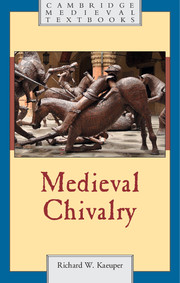Book contents
- Frontmatter
- Dedication
- Contents
- List of figures
- Acknowledgments
- Part I An approach to chivalry: was it real and practical?
- 1 The reality of medieval chivalry
- 2 Models of medieval chivalry
- Part II Three broad chronological phases
- Part III The privileged practice of violence
- Part IV Chivalry, governing institutions, and ideals
- Part V The world of chivalric emotions
- Reflections
- Select Bibliography
- Index
1 - The reality of medieval chivalry
from Part I - An approach to chivalry: was it real and practical?
Published online by Cambridge University Press: 05 August 2016
- Frontmatter
- Dedication
- Contents
- List of figures
- Acknowledgments
- Part I An approach to chivalry: was it real and practical?
- 1 The reality of medieval chivalry
- 2 Models of medieval chivalry
- Part II Three broad chronological phases
- Part III The privileged practice of violence
- Part IV Chivalry, governing institutions, and ideals
- Part V The world of chivalric emotions
- Reflections
- Select Bibliography
- Index
Summary
Chivalry may sometimes seem to slip through our fingers and separate into discrete spheres. This quicksilver quality may tempt scholars to jettison use of the term altogether, considering it too fragmented to sustain meaning. This view, emerging from understandable impatience with sweeping generalization, resembles what medieval philosophers would have termed nominalism with its focus on specific phenomena alone as having meaning, while the general, classifying category is granted no genuine existence. Adopting this view, martial or honor culture might be granted existence in particular traits, attitudes, and acts, but an overarching idea of chivalry would be thought to fail to catch anything general for historical analysis.
Yet the very term chivalry was continually and confidently spoken and written throughout half a medieval millennium. Not all the terms we employ as modern scholars studying those centuries can make this claim to reality in the society they are meant to describe. Feudalism as an abstract noun is a modern construct intended to encapsulate basic aspects of medieval society; but it was not a word used in the Middle Ages and has caused seemingly unending debate among scholars. Chivalry, however, was a term used reflexively by medieval people from the late eleventh century and the twelfth century through the remainder of what we consider the medieval period and beyond. It was their term. They thought it could and should convey important meaning. Their reliance on the term sets our goal of understanding what it meant to them and why they used it.
If some scholars imitate nominalists and avoid the term as overly general, other scholars avoid the term for nearly opposite reasons. They would grant that the values we analyze in chivalry were real, but insist that in fact the ideas or behaviors we are observing in certain medieval centuries represented nothing more than the eternal warrior code. In this view, how warriors think and how they act remain at base a constant, and this enduring code represents what is truly important in scholarly analysis: doughboys in the First World War, Greek hoplites, Native American dog soldiers of the Plains, Carolingian milites, Japanese samurai, high and late medieval knights – all were a part of the grand procession of warriors whose essence is not dependent on specific social and cultural context of time and space.
- Type
- Chapter
- Information
- Medieval Chivalry , pp. 7 - 24Publisher: Cambridge University PressPrint publication year: 2016



